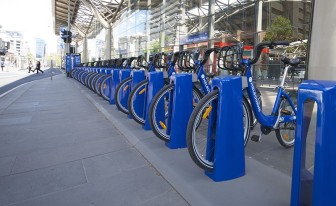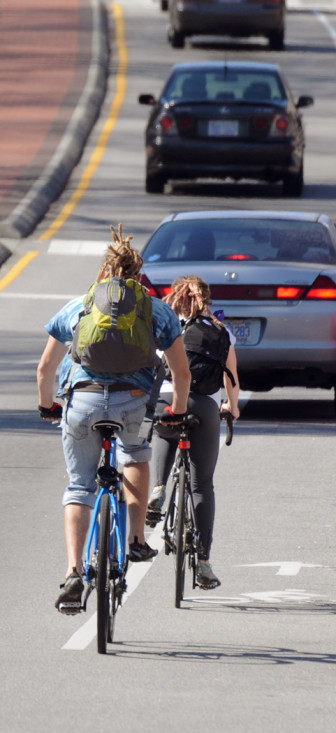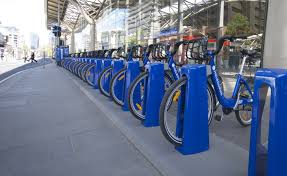In a Tuesday work session, city councilors evaluated the potential of a possible bike-share program.

Wikimedia Commons
A bike station in Melbourne, Australia
The program, which would consist of bike stations throughout the city of Raleigh, would allow citizens to rent a bike for a nominal fee as a form of transportation that some see as more cost-effective than other forms of transit.
“This is a terrific opportunity to accomplish our Comprehensive Plan goals,” Councilor Stephenson said.
The initial implementation of the program would see 30 bike stations installed in locations throughout Raleigh. 25 would be in general locations, while five would be installed on or near North Carolina State University.
“Bike share has a lot of potential to catapult [bike use] in many parts of the country,” Jennifer Baldwin, Raleigh’s bicycle and pedestrian coordinator, said.
The fee structure for users was staggered according to how much time was spent using the bike and had special categories for annual memberships, day rentals, and student use. The first 30 minutes of bike rental would be free. Every additional half-hour is $4 or $2 for students. Annual memberships would cost $80 for the general public and $50 for students, and a 24-hour rental is $8.
“We expect about 600 annual memberships the first year and 12,000 casual members in the first year,” Baldwin said.
Councilors had questions about how the program would be funded, as the cost to maintain the program was larger than the revenue generated through the bike shares.

Karen Tam
Cyclists on Hillsborough Street
Baldwin said most of the bike share programs from other cities showed the need for a public-private partnership, with costs being alleviated through sponsorships that would display advertising on the bikes or the bike stations.
“We do see that there’s a strong potential partnership with North Carolina State University since the students there have shown interest in [the bike share],” Baldwin said.
Councilors explored the different scenarios of how a balance between public funding and private dollars might occur. One of the scenarios showed an even split between the revenue generated from bicycle users, the money raised through private sponsorship and the matching money from the city.
Councilor Odom was concerned that the money raised through private sponsorship would dry up and the city would end up paying that share too. “My fear is that five years down the road that $2 million will be gone and the city of Raleigh will be paying that $2 million.”
“Let’s not underestimate the cost of implementing such a system,” Councilor Maiorano said. “It looks exciting. It really does. It looks promising. We’ll have a very difficult decision to make.”
Eric Lamb, the transportation planning office manager, said that in 2016 the city would have to make a decision to go forward or not based on the amount of private sponsorships generated.
Wake County Board of Commissioner Sig Hutchinson, who used to serve on Raleigh’s Bicycle & Pedestrian Advisory Commission, said he’d like to see the project move forward.
“It fits into the culture of who we are as a city,” he said.
